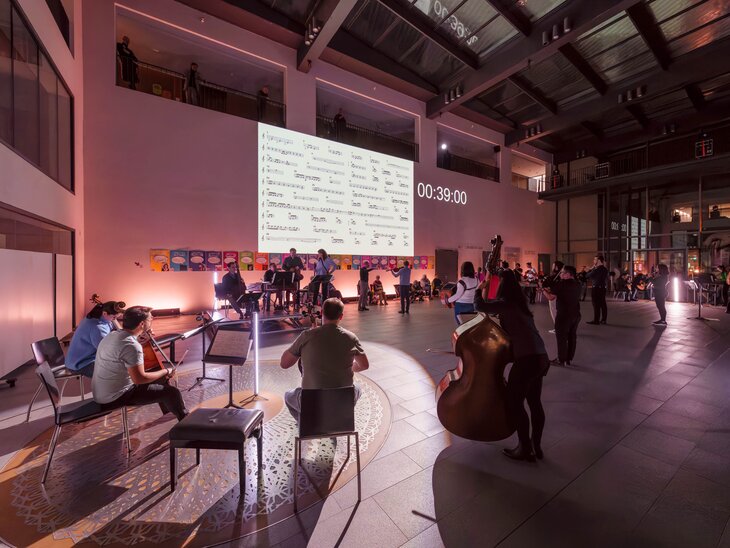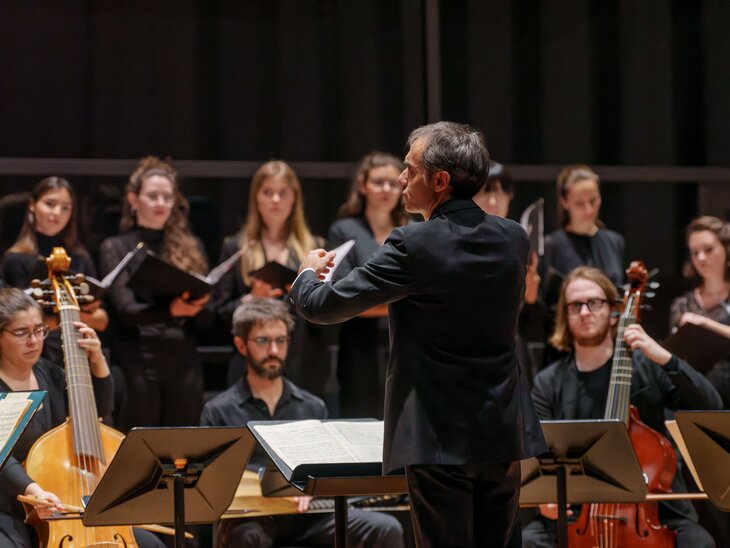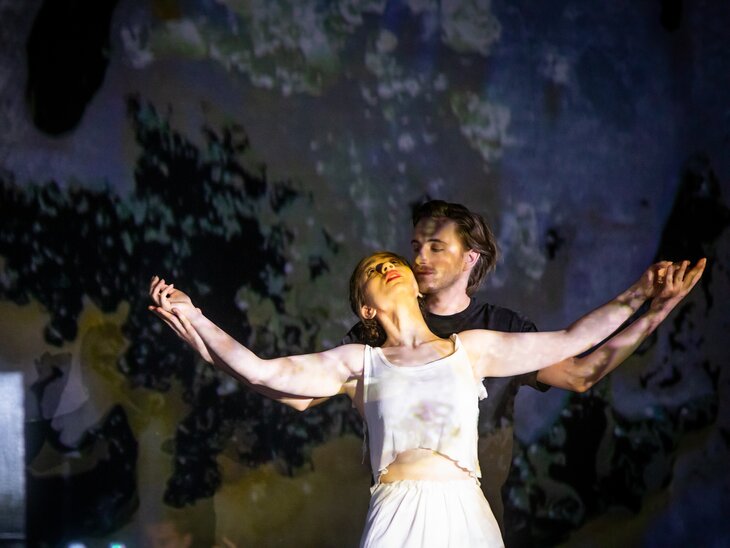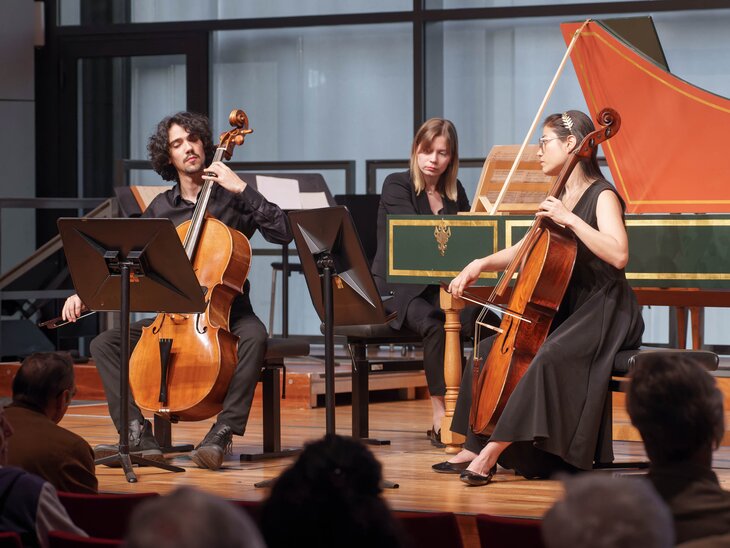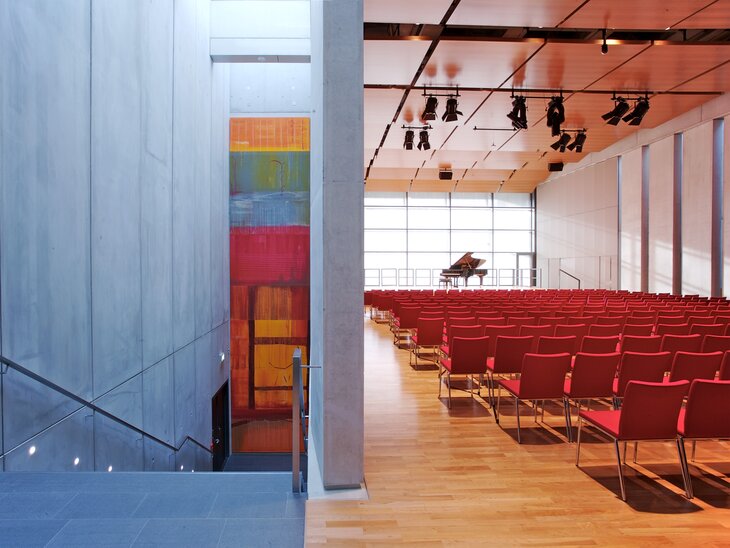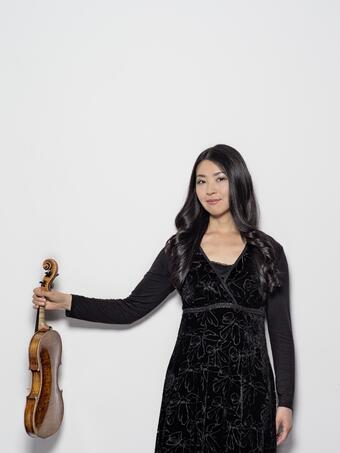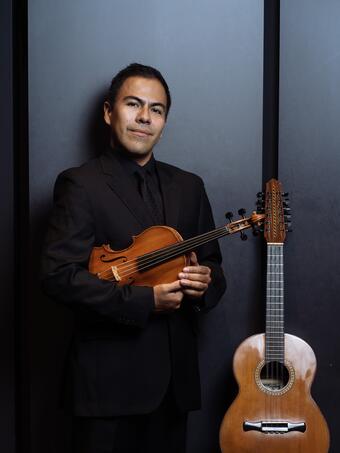Baroque violin / Baroque viola
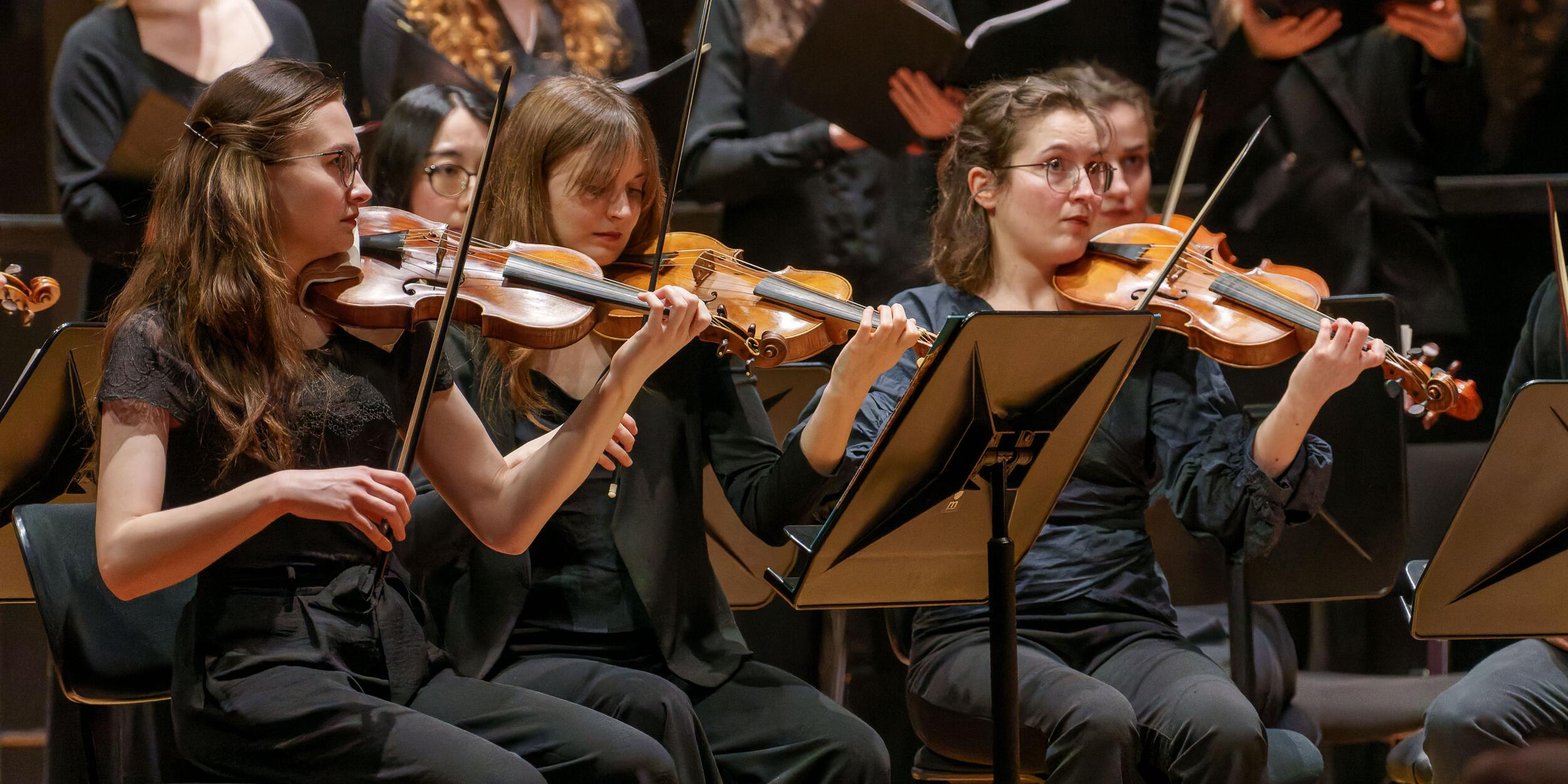
Overview
The teaching in this master's programme builds on students' existing technical skills and knowledge about musical interpretation, while also fostering their personal ideas about sound and their sensitivity to different musical periods and stylistic areas. Students achieve artistic maturity through technical mastery of their instrument, which is developed through a combination of theory and practice.
Department of Studies and Examinations
+43 676 88122 492 studienabteilung@moz.ac.at
Length of course
4 semesters / 120 ECTS-AP
Language
German
Application period
1.2.–28.2.2025
Auditions
summer semester each year
dates see at "Audition dates"
overview of all dates
Downloads
General information
The focus of this degree programme is on further developing and deepening the practice-oriented academic and artistic skills already acquired in a subject-related Bachelor's degree, thus preparing students for a performing career. The MA in Performance qualifies students for professional practice in the following fields:
- Soloist
- Chamber musician
- Orchestral musician (e.g. in chamber/opera/symphony orchestras, orchestras and ensembles for contemporary music, ensembles for historical instruments)
- Freelance artist
The curriculum is competence-oriented. After completing the Master's programme, students should:
- master their instrument at the highest level and be able to present themselves professionally
- be free and independent in their artistic work
- be able to deal critically with artistic and academic issues
- be able to perform professionally in an orchestra/ensemble
- be able to work as a team-player in an artistically constructive way as a member of a chamber music formation or ensemble
- have acquired in-depth knowledge of various playing techniques
- have acquired in-depth knowledge of orchestral repertoire and mastery of the relevant orchestral parts
- have acquired in-depth knowledge and mastery of the solo and chamber music repertoire of various periods
- have in-depth knowledge of stylistics and repertoire
- have mastered the techniques of academic research and writing, and be able to analyse, interpret and write about artistic content in a grounded manner
- be able to use audiovisual media for self-presentation (competition submissions, demo recordings, internet presentations etc.)
- have gained insights into the following areas: safeguarding physical and mental health, self-management and performance optimisation
- have further developed their individual interests beyond their own subject area through targeted consolidation in the context of elective subjects, in the spirit of lifelong learning
The four-semester master's programme is modular in structure. Each module comprises teaching and learning content that has been combined to form thematically and didactically meaningful units of study. The names and content descriptions (study objectives) of the individual modules, the number of ECTS credits to be achieved for each module, and the type of performance assessment are specified in the curriculum. The module descriptions refer to the corresponding learning outcomes and competencies.
The Master's programme is a face-to-face programme and cannot be offered - not even in part - as a distance learning programme. The courses from the Principal Study, as well as in other One-to-One Tuition, are designed to build upon each other. Prerequisite for enrolment in courses from the Principal Study or One-to-One Tuition is a positive evaluation of the previous semester (from the second semester onwards).
The curriculum provides an overview of the courses to be completed, which are grouped into modules.
The courses are visible online in Curriculum Support:
Admission to a master's program requires the completion of a relevant bachelor's degree (BA) or another equivalent degree at a recognised domestic or foreign post-secondary educational institution (e.g. university, college) (§ 64 Para. 3 UG 2002).
A prerequisite for starting the course is also passing an audition. Auditions take place once a year and consist of an instrumental audition and, if necessary, proof of German language skills. All information about the audition can be found under “Information on the admissions process” further down on the page.
PLEASE NOTE: You can only apply for study programmes for which you have not yet obtained a degree!
Students of the Master's programme are encouraged to complete a semester abroad. Semesters 2 and 3 of the degree programme are particularly suitable for this. In addition to subject-specific competences, a study period abroad can also lead to the acquisition and deepening of:
- Subject-specific foreign language skills
- General foreign-language skills (language comprehension, conversation, etc.)
- Organisational skills, through independent planning of everyday student life in international administrative and university structures
- Knowledge about international study systems, as well as broadening one's own subject perspective
- Intercultural competences
Examinations and assessments taken during studies abroad can be approved by the Director of Studies as equivalents to compulsory subjects, elective sujects or free elective subjects required by the Mozarteum University for your degree course. The documents required for the approval procedure are to be submitted by the applicant immediately after their exchange semester.
Details at International Affairs.
Information on the admissions process
Admission to an MA Performance programme requires the completion of a relevant bachelor's degree (BA) or other equivalent degree at a recognised domestic or foreign post-secondary educational institution (e.g. university, college) (§ 64 Para. 3 UG 2002).
A prerequisite for admission to this university course is also the successful completion of an audition. Registration for an audition is completed online via Muvac and requires candidates to upload documents proving their eligibility for the course. An invitation to audition will only be issued after the necessary documents have been submitted in full and approved by the admissions office.
PLEASE NOTE:
- Document checks can take up to 6 weeks! Early registration is therefore recommended.
- Applicants can only apply for degree programmes for which they have not yet obtained a degree!
Applicants whose documents have been approved will be invited to the on-site audition. This consists of an instrumental audition and, if necessary, a test of German language skills.
The following documents must be uploaded in the online application form:
- BA certificate or degree certificate of a relevant degree programme, if the degree programme has already been completed
- Confirmation of current enrolment if the degree programme has not yet been completed (the certificate must be submitted prior to enrolment!)
- Overview of subjects and grades (Transcript of Records) of the BA degree programme
- Official confirmation of the principal study, if this is not evident from the other documents (e.g. "Bachelor of Music" is not sufficient!)
- If further previous studies have been completed, a full overview of subjects and grades (Transcript of Records) of all artistic and pedagogical Master's and diploma studies must also be uploaded.
Format of documents
- The documents can be uploaded as PDF in the application form.
- If the documents are not available in German or English, an official translation must be submitted.
Please note:
Applicants who pass the audition and are offered a university place must ensure that their documents meet the certification requirements by the time of their enrolment at the latest.
2. Once in the MOZonline account: fill in the mandatory statistics UHstat1 (pre-registration for studies) and make a note of the application number that is sent by email upon submission of this information.
3. Create an application account in Muvac
4. Fill out your own profile in Muvac (minimum requirements: personal data, information on expertise matching the desired degree programme, in the CV: current employment and information on previous training)
6. Fill out the application form in Muvac ("Apply now"), being sure to enter your application number (see step 2) or Austrian matriculation number in the appropriate field
Please take a look at the FAQs about registration in Muvac if you get stuck at any of the steps.
- Online registration during the application period via the application portal Muvac (Please note: Registration is only possible if all required information and documents have been submitted!)
- Once the online application has been processed: invitation to on-site audition. The invitation will be sent via Muvac.
- The invitation to audition on-site must be accepted or rejected in Muvac; information on the audition programme in the principal study must be provided if required by the instrument/degree programme in question
- participation in the on-site audition
- Upon passing the audition and being offered a place: invitation to enrol in the degree programme
- Enrolment (in person) during the general admission period
The audition programme must include pieces typical of the baroque violin / viola repertoire from several styles and periods, taking into account technical and stylistic diversity. The following must be prepared:
- three works from different periods (early, high baroque, (pre)classical), taking into account different national styles (Italian, French, mixed style); at least one of the works must be played with basso continuo
- for baroque violin: Composizioni 7, 8 or 12 by Geminiani from "Art of Playing the Violin"
- for baroque viola: Composizioni 4, 5 or 6 by Geminiani from "Art of Playing the Violin" in the version for viola published by Edition Offenburg
- Sight-reading of an easy work
- Oral analysis of a work from the 17th or 18th century
The audition must be played on baroque instruments.
All applicants whose first language is not German must prove their German skills by the time of enrolment at the latest.
- Required language level: at least A2 (Common European Framework of Reference for Languages GER 2001)
- Information on the approved language certificates can be found HERE
Exam A - Instrumental audition to determine artistic aptitude: 18.6.2025
Exam B - German language skills: certificate (to be presented upon enrolment)
Please note that the Mozarteum University Salzburg offers various support options at the time of your audition and during your studies if you have a disability or a chronic illness.
If this applies to you and you would like to take advantage of counselling, please contact Claudia Haitzmann: claudia.haitzmann@moz.ac.at or +43 676 88122 337.
Any questions?
You can find more information about starting your studies here:
